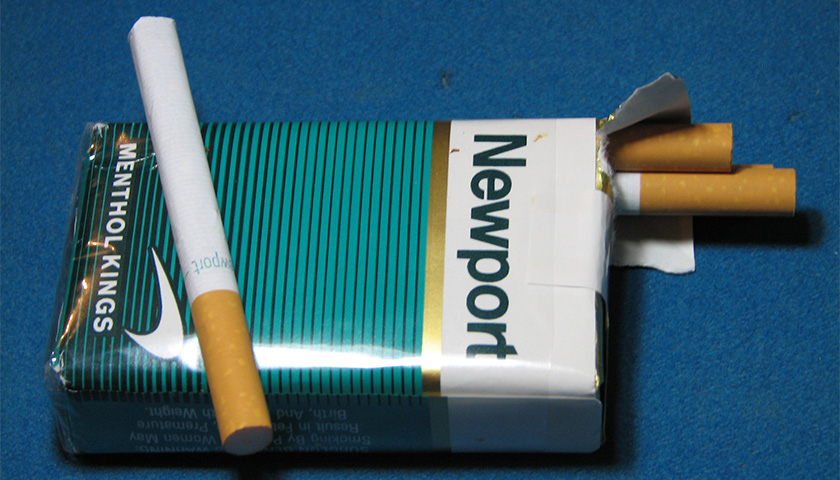by Tyler Arnold
A recent report found a nationwide ban on the sale of menthol cigarettes could cost Virginia hundreds of millions of dollars in revenue.
If the proposed Food and Drug Administration ban on menthols was to go into effect, the commonwealth would lose more than $121.6 million in its first full year of implementation, according to a report from the Tax Foundation. The losses would be caused by lower excise tax revenue, lower sales tax revenue and lower Master Settlement Agreement (MSA) payments.
The report noted menthol cigarettes account for 45% of Virginia’s cigarette sales. The states’ excise tax on cigarettes is 60 cents a pack of 20 cigarettes. Per the report, the excise tax decline as percentage of total decline would be 39%.
Ulrik Boesen, a senior policy analyst for excise taxes at the Tax Foundation, told The Center Square this would affect certain government programs, including health care funding, which benefits from the state’s tax on cigarettes.
“Virginia annually dedicates over $60 million of MSA payments to the Virginia Tobacco Region Revitalization Commission,” Boesen said. “The commonwealth also dedicates MSA revenue to fight childhood obesity. Revenue from the cigarette excise tax is dedicated [to] the Virginia Health Care Fund, which is tasked with providing health care services to the state’s residents. It’s programs like these that may experience dwindling funding post-prohibition.”
Boesen said a prohibition could lead to the sale of illicit tobacco products.
“Banning sales of menthol cigarettes,” he said, “also risks fueling inflows of illicit tobacco products to the state – a problem Virginia has not traditionally had to deal with.”
Governments nationally would lose about $6.6 billion in the first full year after a ban, according to the report.
A handful of states, along with the District of Columbia, already have banned the sale of menthol cigarettes. According to an analysis from the Tax Foundation, a Massachusetts ban caused a 24% drop in sales, but 90% of the decline was from residents purchasing their products out of state.
The FDA and other supporters of the ban have argued banning menthol cigarettes would help save lives and deter youth experimentation with smoking.
“Banning menthol – the last allowable flavor – in cigarettes and banning all flavors in cigars will help save lives, particularly among those disproportionately affected by these deadly products,” acting FDA Commissioner Janet Woodcock said in a statement last year. “With these actions, the FDA will help significantly reduce youth initiation, increase the chances of smoking cessation among current smokers, and address health disparities experienced by communities of color, low-income populations, and LGBTQ+ individuals, all of whom are far more likely to use these tobacco products.
“Together, these actions represent powerful, science-based approaches that will have an extraordinary public health impact. Armed with strong scientific evidence, and with full support from the Administration, we believe these actions will launch us on a trajectory toward ending tobacco-related disease and death in the U.S.”
The Center Square reached out to R.J. Reynolds Tobacco Company for comment, but did not receive a statement by the time of publication. R.J. Reynolds owns the most popular brand of menthol cigarettes in the country, Newport. The Center Square also reached out to the world’s largest tobacco producer, Altria, for comment, but did not receive a response by the time of publication.
– – –
Tyler Arnold reports on Virginia and West Virginia for The Center Square. He previously worked for the Cause of Action Institute and has been published in Business Insider, USA TODAY College, National Review Online and the Washington Free Beacon.
Photo “Newport Menthol Cigarettes” by Officer. CC BY-SA 3.0.




